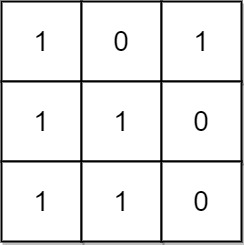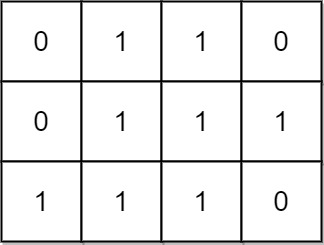1504. Count Submatrices With All Ones
Description
Given an m x n binary matrix mat, return the number of submatrices that have all ones.
Example 1:

Input: mat = [[1,0,1],[1,1,0],[1,1,0]] Output: 13 Explanation: There are 6 rectangles of side 1x1. There are 2 rectangles of side 1x2. There are 3 rectangles of side 2x1. There is 1 rectangle of side 2x2. There is 1 rectangle of side 3x1. Total number of rectangles = 6 + 2 + 3 + 1 + 1 = 13.
Example 2:

Input: mat = [[0,1,1,0],[0,1,1,1],[1,1,1,0]] Output: 24 Explanation: There are 8 rectangles of side 1x1. There are 5 rectangles of side 1x2. There are 2 rectangles of side 1x3. There are 4 rectangles of side 2x1. There are 2 rectangles of side 2x2. There are 2 rectangles of side 3x1. There is 1 rectangle of side 3x2. Total number of rectangles = 8 + 5 + 2 + 4 + 2 + 2 + 1 = 24.
Constraints:
1 <= m, n <= 150mat[i][j]is either0or1.
Solutions
Solution: Dynamic Programming + Stack
- Time complexity: O(mn)
- Space complexity: O(n)
JavaScript
js
/**
* @param {number[][]} mat
* @return {number}
*/
const numSubmat = function (mat) {
const m = mat.length;
const n = mat[0].length;
const cols = Array.from({ length: n }, () => 0);
let result = 0;
const countSubmat = () => {
const submat = new Array(n).fill(0);
const stack = [];
for (let col = 0; col < n; col++) {
while (stack.length && cols[stack.at(-1)] >= cols[col]) {
stack.pop();
}
if (stack.length) {
const prev = stack.at(-1);
submat[col] = submat[prev] + cols[col] * (col - prev);
} else {
submat[col] = cols[col] * (col + 1);
}
stack.push(col);
}
return submat.reduce((result, count) => result + count);
};
for (let row = 0; row < m; row++) {
for (let col = 0; col < n; col++) {
cols[col] = mat[row][col] ? cols[col] + 1 : 0;
}
result += countSubmat();
}
return result;
};